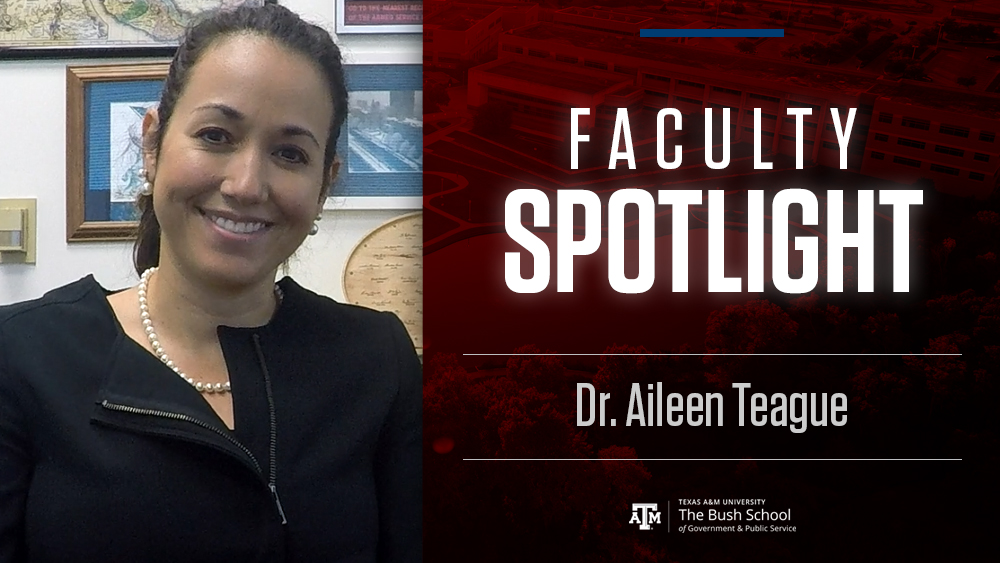
Aileen Teague is an Assistant Professor in the Department of International Affairs and a core faculty member at the Albritton Center for Grand Strategy. She studies U.S.-Latin America relations, works on the Latin America concentration, and serves as a coordinator for The Other Side of the Border: Ties That Bind and Issues That Divide speaker series.
What research projects do you currently have underway?
I’m writing a book right now on the origins and effects of U.S. drug control policies and policing efforts in Mexico from 1960 to 2000. It looks at the forces of militarization and drug enforcement and how they interact with U.S. and Mexican security objectives during that period.
I’m also looking at some other projects with respect to militarization and grand strategy in Latin America. I recently published a piece reimagining the revision to the Mérida Initiative, also called the bicentennial framework, which the United States and Mexico have recently started to work on renegotiating. I’m looking at what the possibilities of that might be for the future.
What do you like most about working at the Bush School?
I like that the Bush School values service as much as academic research and academic background.
I think that people here are motivated, are passionate about service, and want to live that Bush legacy of public service and giving back. It definitely radiates through students and the faculty and with the different types of initiatives we have here at the Bush School.
What is your favorite aspect of teaching?
I love lecturing, and I love talking students through difficult historical episodes.
I also really like helping students with their writing to clarify their argument, helping students to think more in the abstract and finding ways for them to be able to do that in an easier manner. The transition between undergrad to grad school hinges on being able to construct an argument and to be able to articulate your position. A lot of what we do here at the Bush School is helping students to do that better.
Have you ever worked outside of academia? If so, what did you do, and how do you apply that experience to your research and/or teaching?
I was a Marine Corps officer from 2006 to 2010. My experience in the military not only is resonant with working here at the Bush School but also frames the way I look at the role of the military and the forces I’m looking at in Latin America. It shapes the way I look at how foreign policy appears at different levels of politics and society. A lot of times we look at the high-level diplomatic narrative, not realizing how much the story changes and can be influenced at the different levels at which we are operating. My experience in the military really kind of made me appreciate those different levels of policy making.
What research or teaching accomplishment are you most proud of and why?
Before I came to Texas A&M, I taught an experiential learning course on the opioid crisis that had students going out into the community to visit rehab facilities, attend twelve-step meetings, and that sort of thing. The opioid crisis is an underlying cause of a lot of the drug issues that I explore overseas. I was really happy with students being able to engage with the topic in a more hands-on way and look at some of the different views about addiction in society. This is something I hope to work with others here at Texas A&M to implement because there’s a lot we still need to know about addiction in our society.
What is your favorite class to teach, and why?
I’m still at the beginning of my career, so I only have a handful of classes under my belt. U.S.-Mexico Relations is a class I enjoy teaching.
I’m going to be teaching a different version of a course that I’ve taught elsewhere called Latin America and the War on Drugs. It’s probably my favorite course to teach. It’s on the drug trade in Mexico. You get to look at different aspects of a very dynamic issue. You get to look at policy makers in Washington, leaders from across Latin America, production societies, the dynamics of peasant suppliers, and the economics of the drug trade. Different aspects we explore in that course include drug culture, the construction of the illicit market, and the effects of the drug trade in some of these producing countries and how it makes more complex their foreign policies with the United States.
Stay tuned because I’ll be offering it here at the Bush School in the spring of 2023.